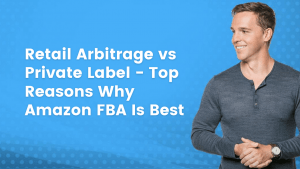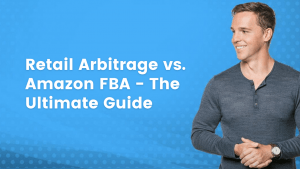Retail Arbitrage vs Private Label | Top Reasons Why Amazon FBA Is Best

Think twice before you invest in an arbitrage business model that might be a sinking ship.
A retail arbitrage hustle can make money. So can a private label brand on Amazon with the FBA program. But one has the power to unlock unlimited earning potential, and give you your life back. SPOILER ALERT: It’s the second one, Amazon FBA.
Before we jump into the reasons why you’re more likely to find success with Amazon FBA, here’s a quick refresh:
• Retail arbitrage is flipping discounted products on Amazon (or other e-commerce platforms) for a profit
• Amazon FBA is working with a supplier to develop a private label product. That product is then marketed and sold on Amazon through the FBA program
• Here’s our guide on retail arbitrage if you want more information
Now it’s time to dive in and discover the top reasons why Amazon FBA is better than a retail arbitrage hustle.
#1: Time
Retail arbitrage takes a lot of time. Visiting stores in person, searching through sales, and packing up inventory can cost you hours each week, if not every day.
Not to mention, you have to create product descriptions for each type of product you source. Does that sound like a lot of work? That’s because it is a lot of work that costs you time (and money, but we’ll get to that later).
Amazon FBA on the other hand means you only have to identify a product, source products, and draft a product description once. After it’s set up, it’ll cost you a few hours a month — if that.
#2: Scale
One of the many reasons business owners love the Amazon FBA model is because it’s designed to scale. This means that you can grow your business without a lot of growing pains. And you can unlock more revenue without dedicating every hour of every day to it.
In short, to scale an Amazon FBA business, you need some money to invest. And you have to make a couple of decisions. That’s it.
Retail arbitrage, on the other hand, trades time for money. So if you want to scale, or grow, it’ll cost you lots of time and lots of money. Here’s a quick example:
• You flip products on Amazon and turn $1k a month in profits
• Right now this costs you 20 hours per week, or 80 hours per month
• If you want to double your profits, you have to double your time investment
• This means you’ll spend 40 hours per week, or 160 hours per month, to make $2k in profits
And if you’re working 40 hours per week for $2k a month, that means you’re earning an hourly rate of $12.50.
Now imagine if you wanted to make $4k a month … yikes.
#3: Risk
At first glance, it looks like retail arbitrage is less risky than Amazon FBA. You spend a couple hundred bucks on discounted notebooks from Office Depot. Then you flip them on Amazon for twice the price. Easy.
That sounds way better than spending thousands on a bulk order from an overseas supplier. But when we dig into it, a private label FBA business actually has less risk. And it’ll cost you less in the long run.
This is because as an Amazon FBA private label seller, you’re in control of the brand. And you aren’t breaking any Amazon seller rules.
Retail arbitrage sellers aren’t in control of the brand, though. They’re at the mercy of the original manufacturer. And they’re at the mercy of Amazon seller rules — and there’s a good chance they’re breaking them.
#4: Money (Short-Term $$$)
We already know that retail arbitrage caps your income based on how much time you can invest. If you can only spend 10 hours a week, you can only make so much money. There’s no easy way to scale profits.
There’s also not a lot of money to be made. Sure, retail arbitrage is a great way to get some quick cash — it’s a side hustle. But it’s not a sustainable way to pay your bills every month because:
• It’s (nearly) impossible to forecast revenue
• You can’t predict which products will be on sale in the future
• The products you flip are based on proximity and other retailers
In short, how much money you make is totally up to external factors that you can’t control.
But with Amazon FBA private label products, you are in control of these factors. You can analyze trends. You can forecast revenue. You can control pricing. In other words, you’re in direct control of how much you take home each month.
#5: Wealth (Long-Term $$$)
Side hustles help you get those student loans paid off faster. They help you save up for a vacation. Or pay off credit card debt.
Side hustles are small boosts in income. They help you achieve small goals, or get over financial hurdles. It’s short-term, and it’s temporary.
Of course, some side hustles turn into entrepreneurial ventures. But there’s something you need to pull that off. You need an easy way to scale. And retail arbitrage just can’t scale. So it can’t build real wealth.
Business owners who adopt the private label Amazon FBA model can scale. And they can build wealth for another reason:
Amazon FBA businesses are assets. They’re bought and sold for millions of dollars.
Yep. If you build a successful Amazon FBA business, you can sell that bad boy for millions of dollars. It’s like real estate, or anything else that appreciates with time. So if you’re interested in making money each month, and planning for your long-term future, a well-developed Amazon FBA business can get you there.
Final thoughts
If you’re considering starting a retail arbitrage business, take a moment to think about your goals. Retail arbitrage makes for a solid side hustle. But if you imagine life without a boss or a future with more money and more time, think again. And consider the Amazon FBA private label model instead. Here’s what we’ve covered in this guide:
• Amazon FBA gives you your time back. Retail arbitrage takes it away
• You can’t easily scale a retail arbitrage hustle. But you can grow an Amazon FBA business
• You’ll make more money, and build wealth faster, with a successful Amazon FBA business
• Plus, it doubles as an asset that you can sell
Curious about Amazon FBA and how it can set you free? Check out our blog for more information about passive income, business models, including how to start Amazon FBA, and more.
